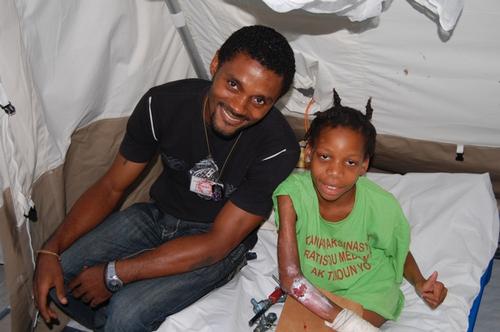Paul Gerard, known as Gerry, is a physiotherapist who had worked with MSF for more than five years. After the earthquake, he was quickly mobilised to help patients with injuries in their rehabilitation process. He works in an MSF post-operative structure set in what used to be a girls school. He spoke about the challenges of being both a victim of the earthquake and a provider of care for his community: "I am 30 years old and I work for MSF as a physiotherapist. I help victims of the earthquake in their rehabilitation by providing manual treatment like massages, or helping amputees with their mobility. Some will have to use crutches or walkers, and I make sure their recovery goes smoothly. "In the MSF centre specialised in post-operative care based in the Lycée, Cent Cinquantenaire, we provide care to a lot people with fractures or amputees. Those with external fixators need to do some exercises during for months. "Between 2004 and 2009, I worked in MSF's trauma centre in Port-au-Prince.

When they called me after the earthquake, I was available immediately. I am in charge of the children's tent when it comes to physiotherapy. "Despite the emotional shock and the fact that I live on the street, I have the ability and the skills to provide support to patients who, like all of us, are traumatized. "National staff is of critical importance here in Haiti because we are the bridge between international aid and the victims, and of course we are victims ourselves. Helping people is helping us in a way. We know the area, we know how people feel and so we can help determine what to do. The fact that we speak Creole also helps to have a clear communication between aid and the victims." A survivor helping survivors "I work for MSF but, like millions of others, I am suffering from the consequences of the earthquake. Compared to others I am relatively lucky, but I live in a tent and rely on food aid to survive. And when I move around in the city, I witness the incredibly difficult conditions people live in and the desperate need for more aid. "At the moment of the earthquake, I was standing at the back of a pick-up car so I did not actually feel it, but when I stepped down from the car, I realized that everything was destroyed, that there was dust and blood all over the place. People were screaming and looking for members of their family. "It was also my first reaction. I started running home to see what had happened to my family. My house has a few cracks but nobody was hurt. We are really lucky as, but of course quite a few people I know have died. A guy who lives on my street lost nine members of his family including his daughter of 17. When I compare to my situation, I feel blessed. "A few days later we received some aid items including a tent and that's where we live now, next to our house. We receive food aid, pre-packaged food kits in little boxes which I think are normally for soldiers. "When I travel around in the city I see a really awful situation with people forced to live next to the rubble of their houses. With the international aid, things are slightly better, but there's still so much to do." Fear of the rain "People are really scared of the rainy season. Yesterday we had a little bit of rain and people were suffering already. People are sleeping under bed sheets and on blankets. Many don't even have any plastic above their heads. "People are very confused: It is true that a lot has been done, but there is still a lot of stuff that is stuck in warehouses and not getting distributed. I feel that as time goes by and with the arrival of the rainy season, people may lose patience. People will complain more and become more demanding. The atmosphere will change. "If infectious diseases start spreading, affecting children and old people, there might be more and more complaints. No one really knows what can happen. "The earthquake has changed my conception of daily life. I don't do medium or long term planning anymore but I try to see week after week where my life can go. In my line of work, there will probably be a lot of work in the coming period, but we are still in the emergency period so I don't know if I will still be needed by MSF, if I'll work for a local organization. I just don't know. But I hope I can keep working in that field because I love what I do. But these days, nothing is certain."



